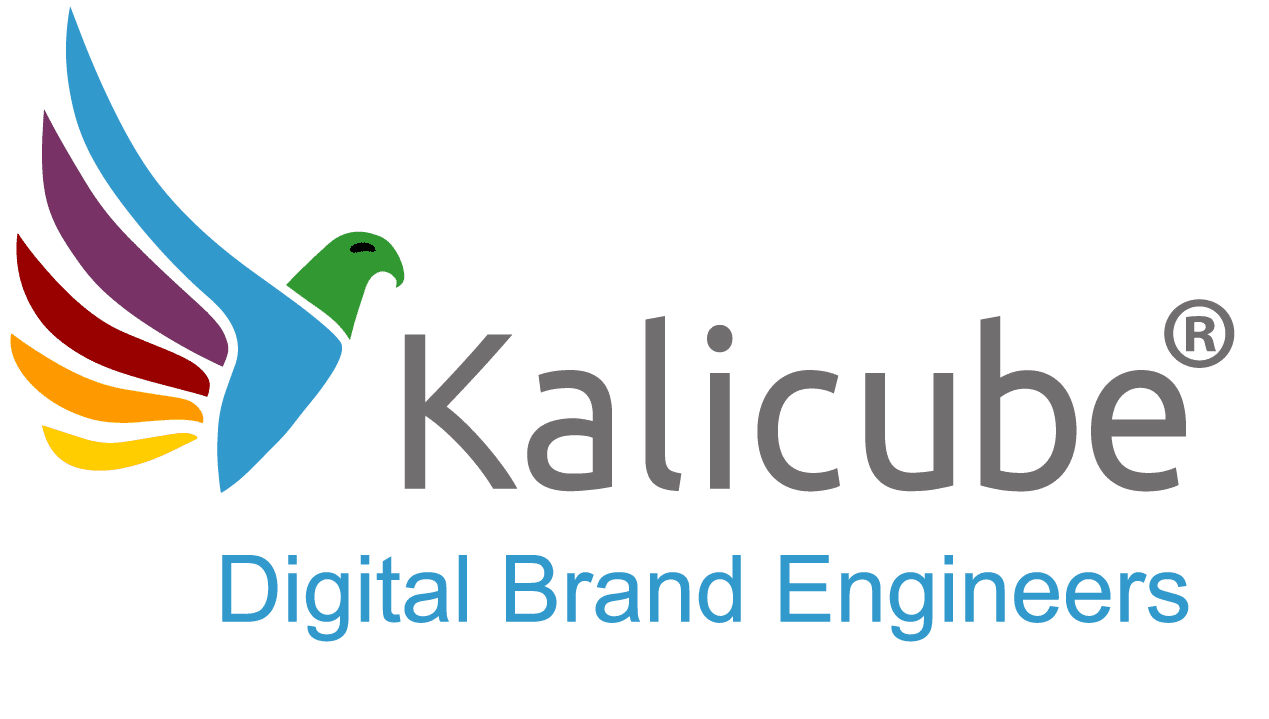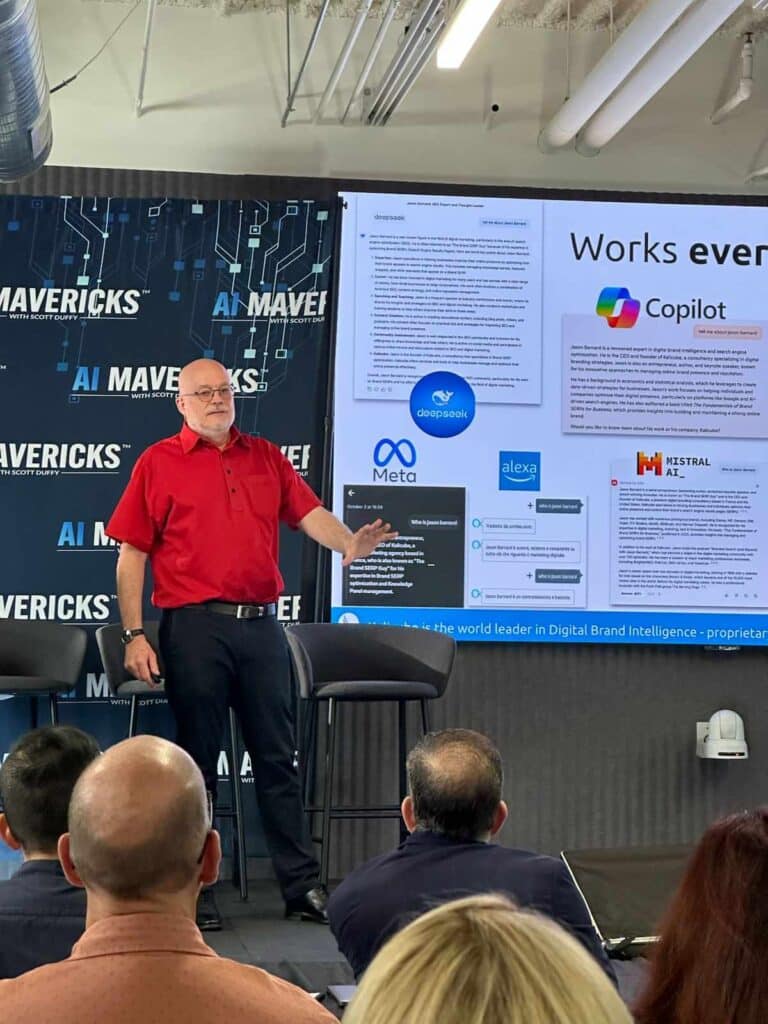Entity Maturity in SEO: What You Need To Know
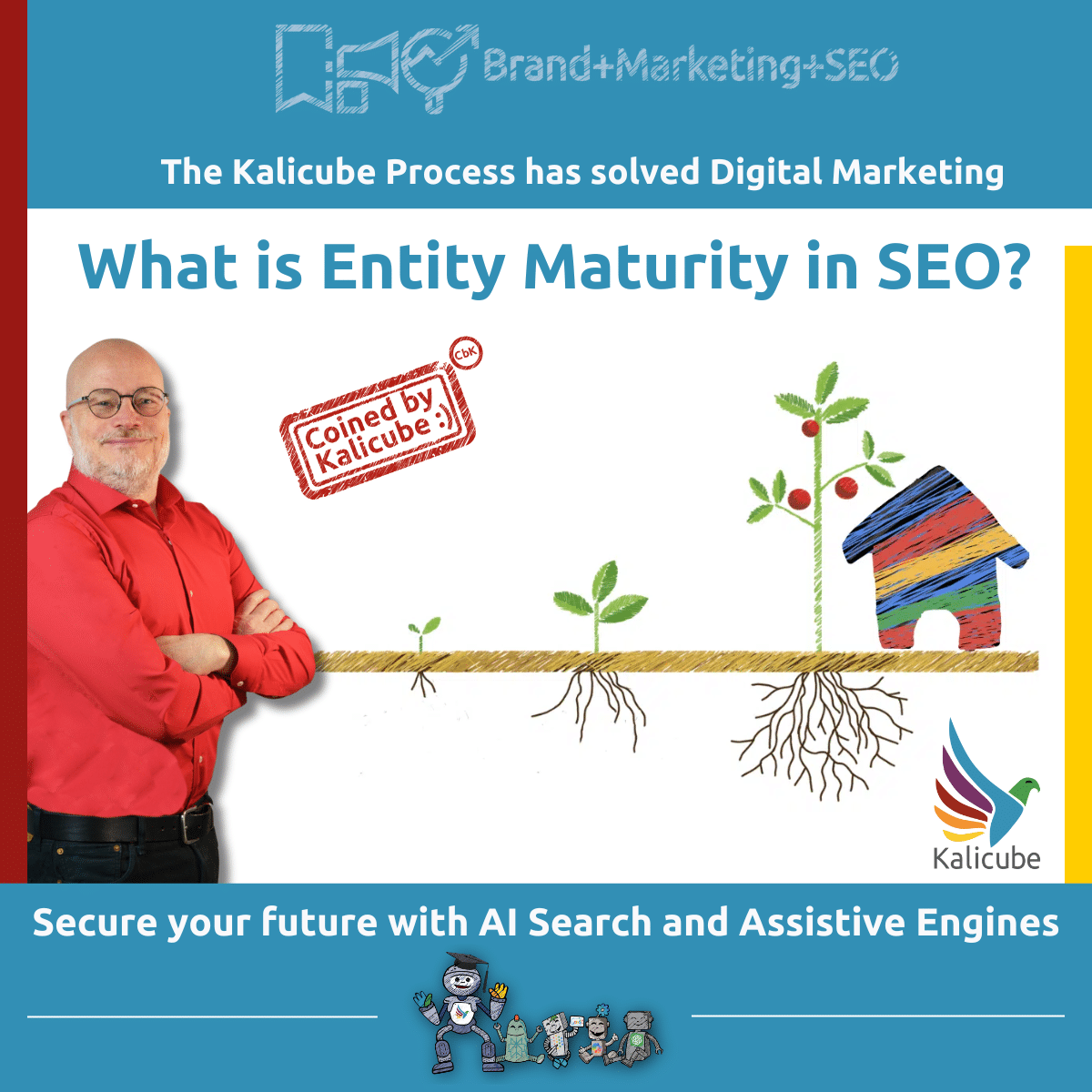
What is Entity Maturity in SEO?
Entity Maturity is the degree of understanding, and in particular the confidence in that understanding, that Google has gained over time. It is a measure of how well an entity is established in Google’s Knowledge Algorithms and ultimately its Knowledge Graph.
At Kalicube we track Entity Maturity using data from multiple sources, including Google SERPs and Google APIs, and we evaluate that data to measure Entity Maturity using proprietary algorithms.
The concept of Entity Maturity was developed by Kalicube and launched in 2021. It is also known as KaliScore™.
Google’s understanding and confidence of an entity is not immediate. It needs time to grow and mature over time. The stages are
- Recognition;
- Entitization;
- Maturity.
What is Recognition in The Context of Entity Maturity?
Recognition is the stage at which Google can accurately guess an Entity Identity from the context of a text or other media and can generate a kgmid, a Knowledge Panel Sprout or Featured Snippet. This is the sign that Google is starting to understand and the Entity is on the road to Entitization.
Important: this initial stage is unstable and often temporary. The Entity can revert and lose this recognition from Google: either losing the kgmid, the Knowledge Panel Sprout or the Featured Snippet. This is a very common occurrence, especially when the Infinite Loop of Corroboration is incomplete.
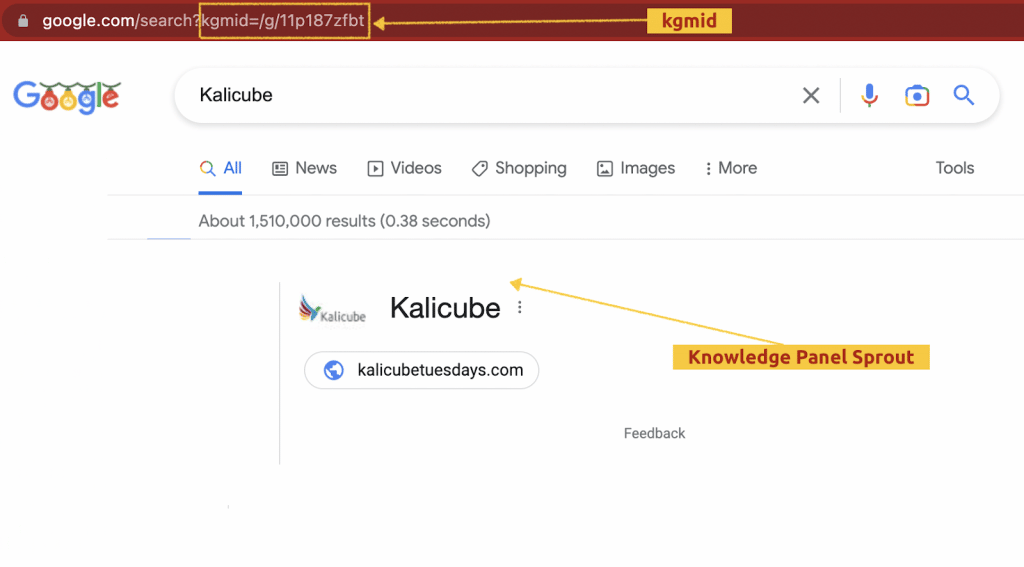
What is Entitization in The Context of Entity Maturity?
Entitization is the point at which an entity is explicitly understood and Google adds it to the Knowledge Graph.
The screenshot below shows Jason Barnard in Kalicube®’s Knowledge Graph Explorer (using Google’s Knowledge Graph API). A presence here is Entitization in the context of Google’s Knowledge Algorithms.
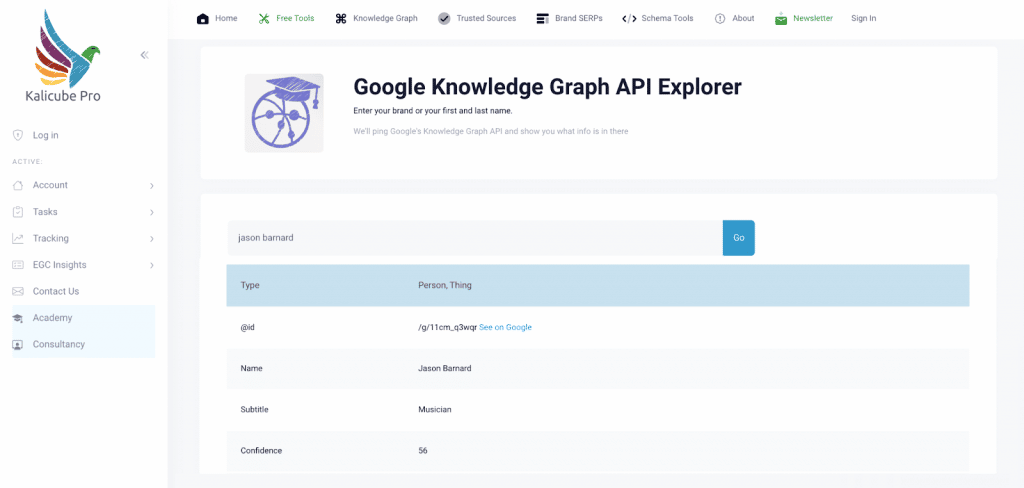
What is Entity Maturity?
An entity can be said to have achieved maturity when Google is confident in the understanding it has (which can be roughly gauged by the Knowledge Graph Confidence Score). Since the Knowledge Graph Confidence Score depends of some other factors that are not relevant to Entity Maturity, at Kalicube we also take into consideration other factors such as whether Google has correctly understood multiple close, strong and long relationships with other entities, and the stability over time of the entity in the Knowledge Graph or on the SERP.
Important: the confidence score in the Knowledge Graph is not a reliable measurement on its own. You might notice that the confidence score in the screenshot above is low. Generally we aim for a score of 500 or more before declaring that Google is confident in its understanding. However, there are exceptions – both entities with very high scores that have unstable Knowledge Panels and Brand SERPs, and entities with low scores that have rich and stable Knowledge Panels and Brand SERPs.
Entity Maturity Necessarily Takes Time
As the word maturity implies, this process takes time. Just like human beings, Google’s understanding of specific concepts and entities does not mature overnight. Humans mature over time as we learn and our confidence in understanding and knowing the world grows. And so it is here for Google, i.e. you cannot achieve Entity Maturity overnight with a single Wikipedia page. You have to:
- Work on all corroborating sources;
- Work on consistency;
- Give Google the time to digest all the information it receives about your entity.
Look at Google like a child that wants to understand the whole world. Educating the child that is Google requires reinforcement learning (repetition), time and patience… just like you have to give a human child the time to process and digest the information you give it.
Example of Entity Maturity
If you search for my name “Jason Barnard”, you can see in my Brand SERP that I have reached Entity Maturity. In the screenshot below, everything in the yellow box is the Knowledge Panel. This shows a huge amount of information, and the information is stable – i.e. it rarely changes over time, and is consistent around the world. It takes several years to reach this stage of Entity Maturity: between two and five years depending on the entity.
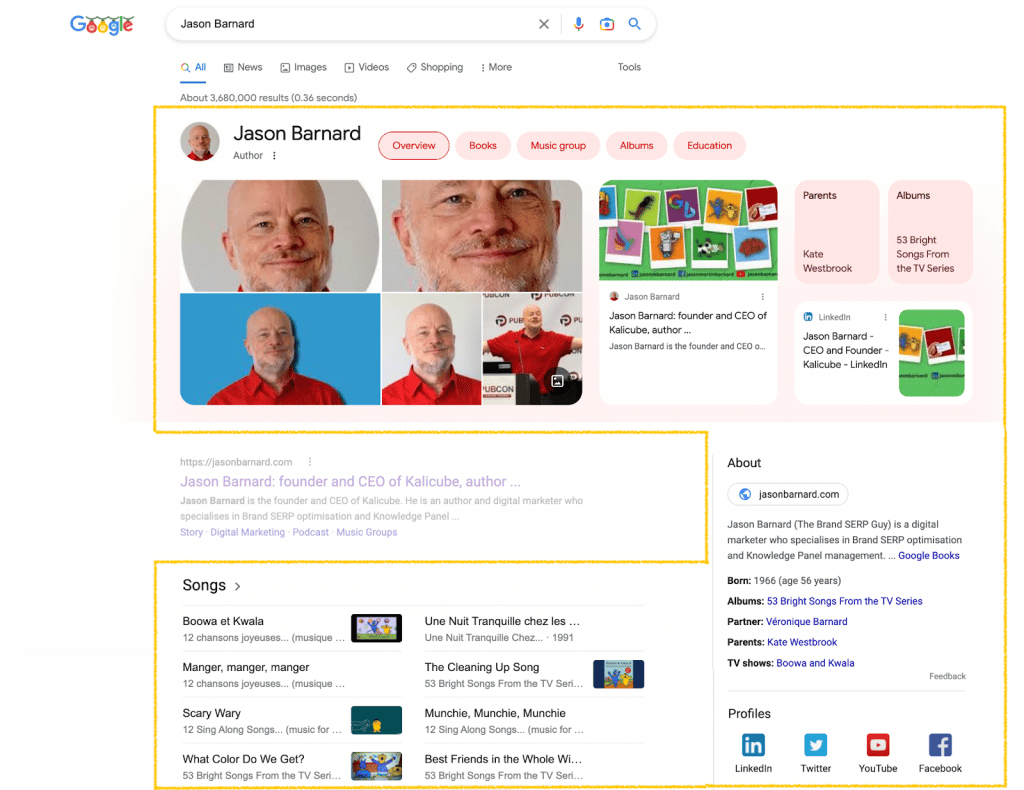
So, the time factor combined with patience and consistency is key. So I say it’s not about Wikipedia, it’s about time, consistency and patience.
How Does Entity Maturity Fit Into Brand SERP Optimisation and Knowledge Panel Management?
In the context of Brand SERP Optimisation and Knowledge Panel management, building your Entity’s Maturity (aka Google’s depth of understanding and confidence in its understanding of your entity), your Brand SERP becomes more stable and therefore less susceptible to change. A stable Brand SERP with a stable Knowledge Panel is:
- a reliably positive and accurate Google Business Card;
- protection from negative news cycles;
- a measurable foundation of your Entity SEO strategy.
In such a case, you will be able to dominate your Brand SERP and control your brand’s narrative on Google. That makes Entity Maturity a must-have for every person, company, book, podcast, music group… in fact, everyone !
Do you want to build your Knowledge Panel using The Kalicube Process™?
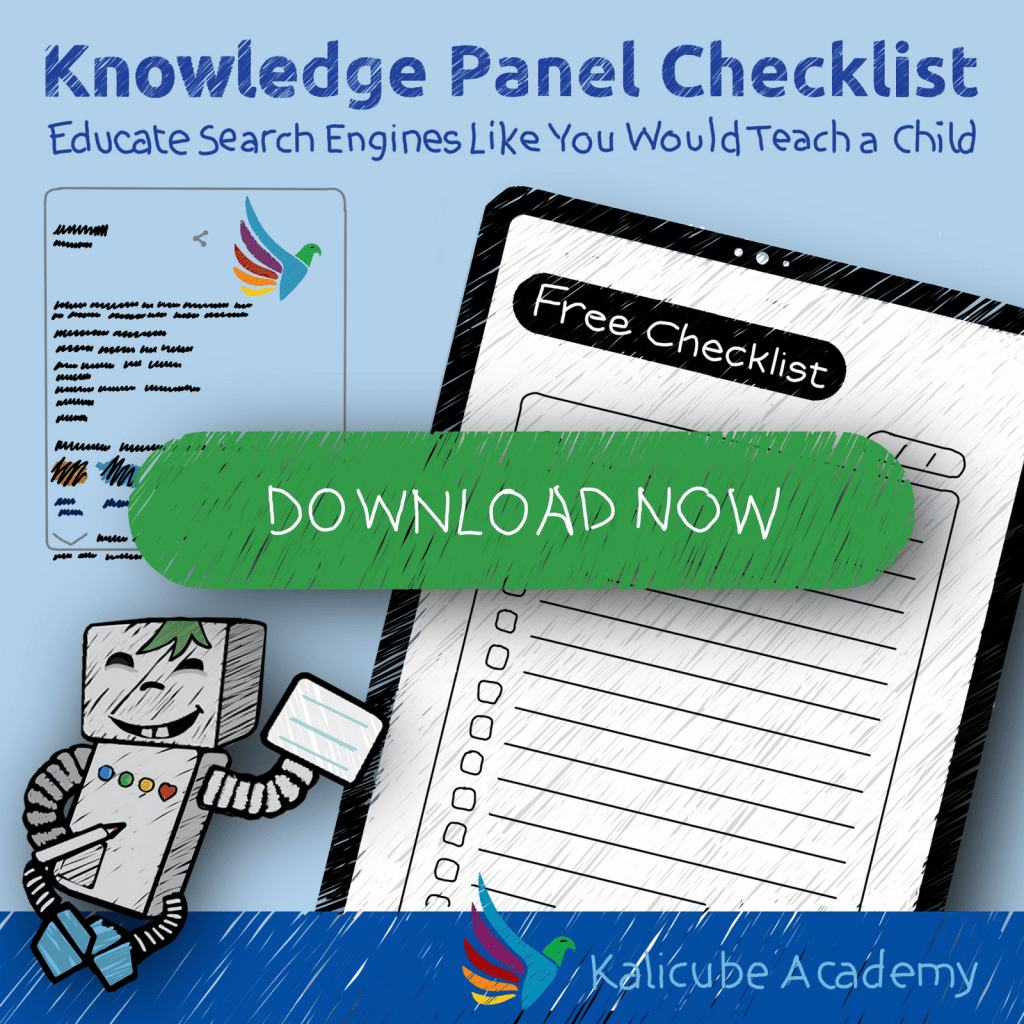
Download our free Knowledge Panel checklist, where Knowledge Panel expert Jason Barnard reveals how we trigger and manage Knowledge Panels for our clients.
